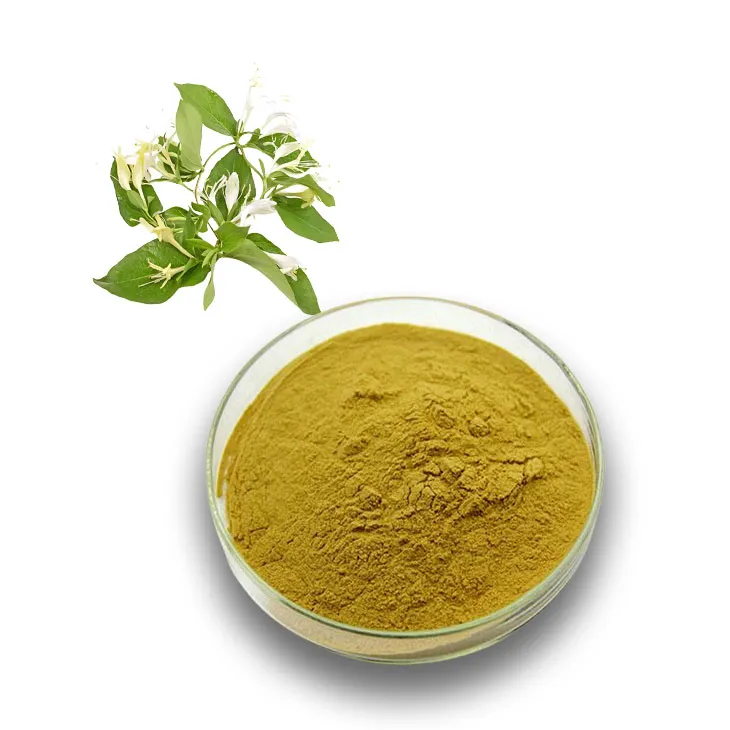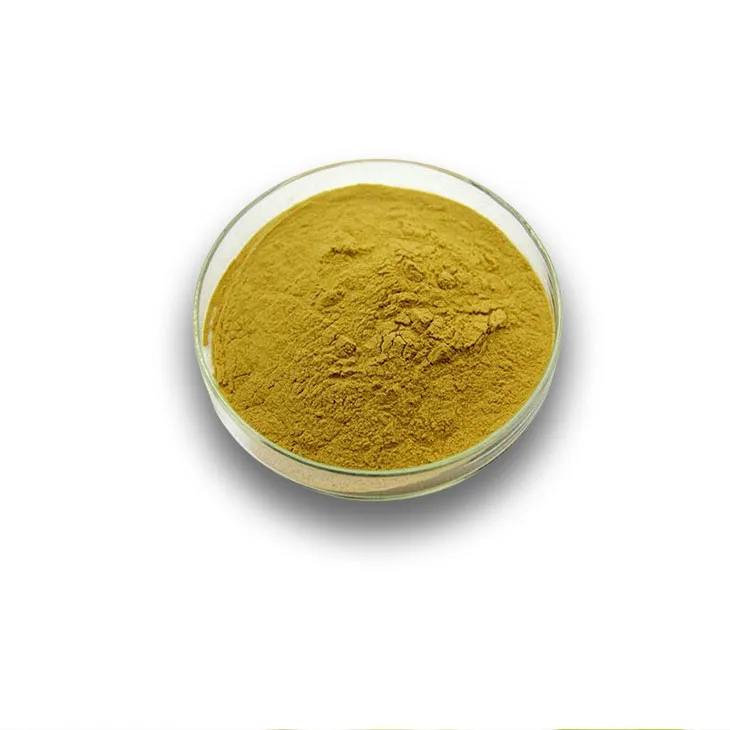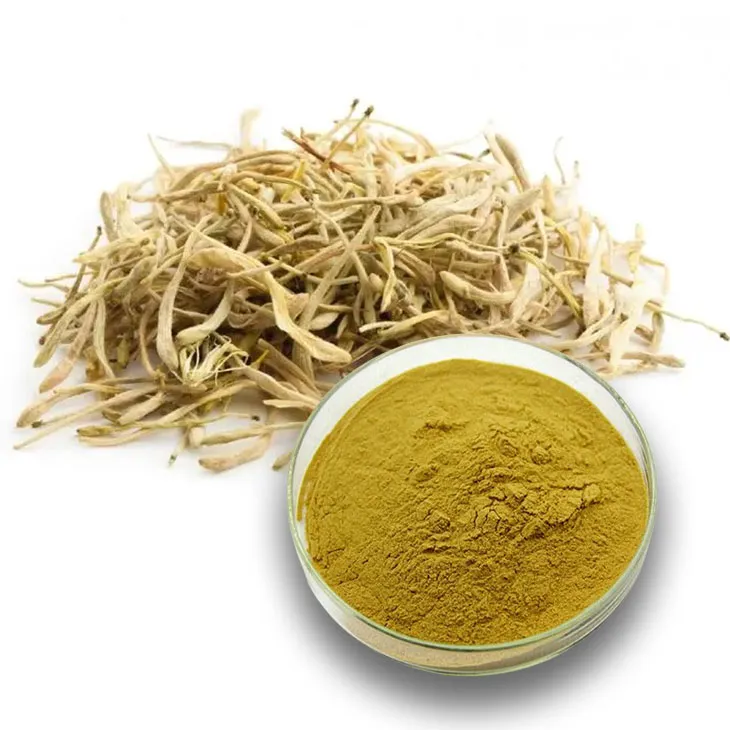- 0086-571-85302990
- sales@greenskybio.com
Organic non - transgenic honeysuckle pollen.
2024-11-28

1. Introduction to Honeysuckle and Its Pollen
Honeysuckle is a well - known plant with a long history of use in various aspects. It is widely distributed in many regions and has been an important part of traditional medicine and natural remedies. Honeysuckle Pollen, as a product derived from this plant, is also gaining more and more attention.

2. The Significance of Organic Label
2.1 Environmentally Friendly Cultivation
The organic label attached to Honeysuckle Pollen indicates that it is cultivated following strict environmental standards. Organic farming practices for honeysuckle involve using natural fertilizers such as compost and manure instead of synthetic chemicals. This not only reduces the pollution of the soil and water sources but also helps to maintain the ecological balance of the cultivation area. For example, it encourages the growth of beneficial insects and microorganisms in the soil, which in turn contribute to the healthy growth of honeysuckle plants.2.2 Sustainability
Organic cultivation of honeysuckle for pollen production is also a sustainable approach. It focuses on long - term productivity without depleting the natural resources. Farmers who follow organic practices are more likely to rotate crops, which helps to improve soil fertility over time. This means that the land can continue to produce high - quality honeysuckle plants for pollen extraction year after year, without causing degradation to the environment.
3. Non - Transgenic Features
3.1 Purity and Originality
The non - transgenic characteristic of Honeysuckle Pollen makes it a pure and original product. In a world where genetically modified organisms (GMOs) are becoming more common, non - transgenic honeysuckle pollen stands out. It has not been genetically engineered, which means it retains its natural genetic makeup. This is important for those who prefer natural products and are concerned about the potential risks associated with GMOs.3.2 Consumer Trust
Consumers are increasingly interested in non - transgenic products. For many, non - transgenic honeysuckle pollen represents a safer and more trustworthy option. They believe that products in their natural state are more likely to be free from unexpected side effects or long - term health risks. This has led to a growing market demand for non - transgenic honeysuckle pollen.
4. Nutritional Components in Honeysuckle Pollen
4.1 Essential Amino Acids
One of the most remarkable aspects of organic non - transgenic honeysuckle pollen is that it is packed with essential amino acids. These amino acids are the building blocks of proteins in the human body. There are nine essential amino acids that the human body cannot synthesize on its own and must obtain from the diet. Honeysuckle pollen contains a variety of these essential amino acids, such as lysine, leucine, and phenylalanine.4.2 Contribution to Protein Synthesis
The presence of these essential amino acids in honeysuckle pollen is crucial for protein synthesis in the body. Proteins play numerous vital roles in the body, including building and repairing tissues, acting as enzymes to catalyze biochemical reactions, and serving as antibodies to fight against diseases. By consuming honeysuckle pollen, individuals can supplement their diet with these essential amino acids, which may enhance the body's ability to synthesize proteins and maintain overall health.
5. Health Benefits of Honeysuckle Pollen
5.1 Digestion and Absorption
Honeysuckle pollen may contribute to better digestion and absorption. It can interact with the body's digestive system in a positive way. For example, it may help to stimulate the secretion of digestive enzymes, which are essential for breaking down food into smaller molecules that can be easily absorbed by the body. Additionally, it may also improve the function of the intestinal mucosa, which is responsible for absorbing nutrients from the digested food.5.2 Detoxification
In terms of traditional uses, honeysuckle pollen has been used to help with detoxification. It is believed to have the ability to remove toxins from the body. Toxins can accumulate in the body due to various factors such as environmental pollution, poor diet, and stress. Honeysuckle pollen may act as a natural detoxifier, helping to cleanse the liver and kidneys, which are the main organs involved in detoxification processes.5.3 Immune System Support
Another potential health benefit of honeysuckle pollen is its support for the immune system. The essential amino acids and other nutrients in the pollen may help to strengthen the immune system. A strong immune system is essential for protecting the body against various diseases, including infectious diseases and chronic illnesses. By consuming honeysuckle pollen, individuals may be able to enhance their immune function and reduce the risk of getting sick.6. Honeysuckle Pollen in Health - Promoting Products
6.1 Dietary Supplements
Given its various health benefits, honeysuckle pollen is a popular ingredient in dietary supplements. These supplements are designed to provide additional nutrients to the diet, especially for those who may not be getting enough from their regular diet. Honeysuckle pollen - based dietary supplements are available in different forms, such as capsules, tablets, and powders.6.2 Herbal Remedies
In traditional herbal medicine, honeysuckle pollen has also been used as an ingredient in herbal remedies. These remedies are often used to treat various health conditions, such as digestive problems, skin disorders, and respiratory infections. Herbalists may combine honeysuckle pollen with other herbs to create more effective remedies.6.3 Cosmetic Products
Honeysuckle pollen is also finding its way into cosmetic products. It is believed to have beneficial effects on the skin, such as moisturizing, anti - aging, and anti - inflammatory properties. Cosmetic products containing honeysuckle pollen may include creams, lotions, and face masks.7. Considerations for Consumption
7.1 Quality Control
When consuming organic non - transgenic honeysuckle pollen, it is important to ensure its quality. This includes checking for proper harvesting, processing, and storage. High - quality honeysuckle pollen should be free from contaminants such as pesticides, heavy metals, and other harmful substances. Consumers should look for products that have been tested and certified by reliable organizations.7.2 Allergies
Although honeysuckle pollen has many potential health benefits, some people may be allergic to it. Allergic reactions can range from mild symptoms such as itching and sneezing to more severe reactions such as difficulty breathing and anaphylactic shock. People with known pollen allergies should be cautious when consuming honeysuckle pollen - based products and consult a doctor if necessary.7.3 Dosage
The appropriate dosage of honeysuckle pollen may vary depending on individual factors such as age, health status, and the purpose of consumption. It is important to follow the recommended dosage instructions provided by the manufacturer or a healthcare professional. Taking too much or too little may not achieve the desired health benefits.8. Conclusion
Organic non - transgenic honeysuckle pollen is a valuable substance with many potential health benefits. Its organic and non - transgenic characteristics make it an appealing option for those who are interested in natural and pure products. With its rich nutritional components and various health - promoting properties, it has a wide range of applications in dietary supplements, herbal remedies, and cosmetic products. However, consumers should also be aware of the considerations for consumption, such as quality control, allergies, and dosage, to ensure its safe and effective use.
FAQ:
1. What are the main health benefits of organic non - transgenic honeysuckle pollen?
Organic non - transgenic honeysuckle pollen is rich in essential amino acids which are important for building proteins in the human body. It may contribute to better digestion and absorption by interacting positively with the digestive system. Also, it has been traditionally used for detoxification and is a potential ingredient in health - promoting products.
2. Why is the organic" label important for honeysuckle pollen?
The "organic" label indicates that the honeysuckle plants are cultivated in an environmentally friendly and sustainable way. This means that there are no harmful pesticides or chemicals used during the growth process, making the pollen a purer and more natural product.
3. What does "non - transgenic" mean for honeysuckle pollen?
"Non - transgenic" means that the honeysuckle pollen is a pure and original product without any genetic modification. This characteristic ensures that the pollen retains its natural properties and potential health benefits.
4. How can organic non - transgenic honeysuckle pollen help with digestion?
It contains essential amino acids that can interact with the body's digestive system in a positive way, which may lead to better digestion and absorption of nutrients.
5. Can organic non - transgenic honeysuckle pollen be used in detoxification?
Yes, in terms of traditional uses, it has been used to help with detoxification, so it has the potential to be a part of products related to detoxification.
Related literature
- "The Health Benefits of Organic Honeysuckle Products"
- "Non - Transgenic Pollen: A Pure and Natural Option"
- "Honeysuckle Pollen in Traditional Medicine and Modern Health"
- ▶ Hesperidin
- ▶ Citrus Bioflavonoids
- ▶ Plant Extract
- ▶ lycopene
- ▶ Diosmin
- ▶ Grape seed extract
- ▶ Sea buckthorn Juice Powder
- ▶ Fruit Juice Powder
- ▶ Hops Extract
- ▶ Artichoke Extract
- ▶ Mushroom extract
- ▶ Astaxanthin
- ▶ Green Tea Extract
- ▶ Curcumin
- ▶ Horse Chestnut Extract
- ▶ Other Product
- ▶ Boswellia Serrata Extract
- ▶ Resveratrol
- ▶ Marigold Extract
- ▶ Grape Leaf Extract
- ▶ New Product
- ▶ Aminolevulinic acid
- ▶ Cranberry Extract
- ▶ Red Yeast Rice
- ▶ Red Wine Extract
-
Licorice Root Extract Powder
2024-11-28
-
Bamboo Leaf extract
2024-11-28
-
Elderberry Extract
2024-11-28
-
Lavender Extract
2024-11-28
-
Rosemary extract
2024-11-28
-
Hawthorn Extract
2024-11-28
-
Hops Extract
2024-11-28
-
Reishi mushroom extract
2024-11-28
-
Diosmin
2024-11-28
-
Coconut Water Powder
2024-11-28





















